Propane requires air - it must always be kept outdoors …
An ounce of prevention makes barbecued food taste better!
Many households use propane gas as part of their daily summer rituals when delightful smells fill the air from foods being grilled on neighborhood family barbecues. It is important however to know that the propane tanks that fuel these cooking appliances and other propane-fired appliances such as fireplaces, not only require precautionary measures in handling, but are also subject to different municipal and agglomeration regulations.
Learn about the applicable regulations
Installing a propane tank requires no permit or certificate of authorization from the town. However, certain regulations apply and must be met.
Article 4.4 of Zoning By-law No 90-58 requires that all tanks, including propane cylinders, be screened from street view. Furthermore, it is prohibited to store these tanks in the property’s front setback, as they are only permitted in the rear yard or on the side of the house.
The Service d’incendie de l’agglomération de Montréal (SIM) Fire Prevention By-law also provides certain restrictions regarding the use of portable cooking appliances and other appliances fueled by propane, specifically concerning the location of the tanks and their proximity to the dwelling.
Prevent explosion hazards
Propane tanks must be stored outdoors at all times. They are prohibited inside buildings or enclosed areas such as garden sheds, huts, garages or other structures that do not have adequate ventilation.
Since pressure inside cylinders builds up considerably when the ambient temperature rises, you must avoid exposing the tank to sunlight. For the same reason, you should avoid any exposure of the cylinders to a temperature above 50°C, to an open flame, or to any other ignition source.

Limited life span
Propane gas tanks have a useful life of 10 years. Defective cylinders or those that are more than 10 years old must be removed from service and dropped off at a propane distributor, who will dispose of them safely. It is also safe to dispose of the tanks during the Household Hazardous Waste Collection or by dropping them off at one of Montreal Agglomeration Ecocentre. Never throw a propane cylinder in the garbage because even if it seems empty to you, it may still contain sufficient propane to cause an explosion.
Get all the information
The Régie du bâtiment du Québec offers valuable safety advice on the use, manipulation and transportation of propane tanks. In case of fire when using propane, it is strongly recommended that you:
-
Evacuate the premises immediately;
-
Call the Fire Department;
-
Not try to extinguish the flames unless you are able to turn off the cylinder valve.
Questions?
The Urban Planning Department is responsible for ensuring compliance with the planning By-law and can help you better understand its requirements. The Department can be reached during regular business hours in person at the Town Hall’s Urban Planning desk or by calling 514 694-4100. An information request can also be sent online through the Requests on Line system which can be accessed at any time through the Town’s website.


